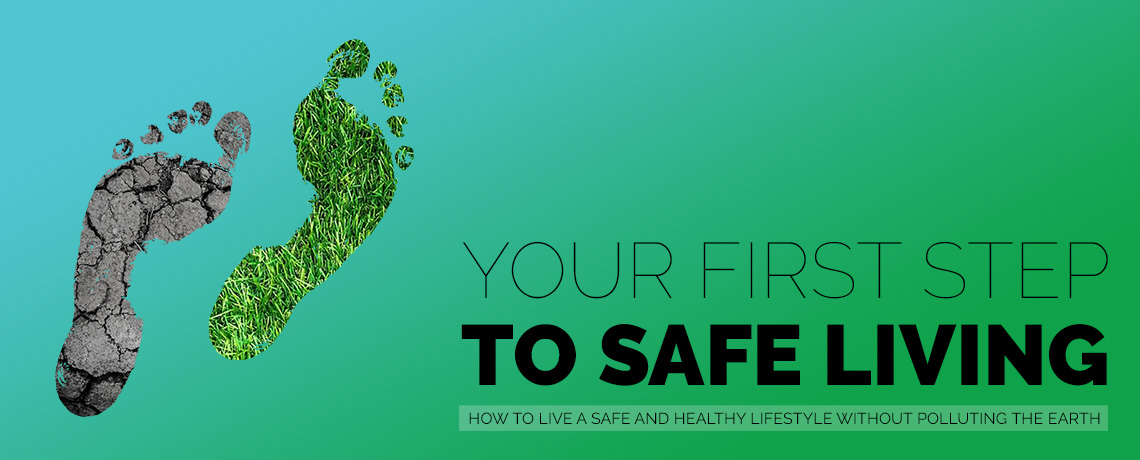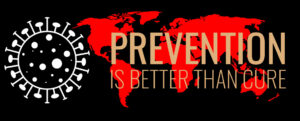
“The man has been endowed with reason, with the power to create, so that he can add to what he’s been given. But up to now, he hasn’t been a creator, only a destroyer”
– Anton Chekhov
Life has become so tough, so toxic, so chemically influenced for various reasons that we assume safe living as almost impossible nowadays. But it is not. To achieve a safe living, you don’t have to change everything in your life at once. It is better to make small changes, turn them into habits and then make more changes. To be more specific, safe living is a practice of being close to nature, and becoming more environmentally conscious.
Safe Living, Natural Living. Many people are attracted to the idea of safe or natural living. However, it is often difficult to define exactly what we mean by “Safe Living” as there are different interpretations and explanations of this phrase. Life has become so tough, so toxic, so chemically influenced for various reasons that we assume safe living as almost impossible nowadays. But it is not. To achieve a safe living, you don’t have to change everything in your life at once. It is better to make small changes, turn them into habits and then make more changes. To be more specific, safe living is a practice of being close to nature, and becoming more environmentally conscious. When the notion of natural and safe living did arise some years before, people were primarily conscious about the dangers of pesticides only. Now people are not only considering the elimination of pesticides or chemicals as a means to safe living but they are equally concerned about their overall health and wellness in all aspects of their lives.
Organic, Natural, Sustainable, and Non-toxic Ways to Safe Living: The present detrimental and eco-destructive world continuously reminds us to return to a safe living practice. The conversion will be good for us and for our future generations. This shift is not at all tough. Some ways can help us to live safe, like going for a walk; eating better, healthy, natural whole foods; doing meditation to release stress; following 3Rs – reduce, reuse and recycle.
To start a safe living, inevitably we need safe products first. Presently, Fast Moving Consumer Goods (FMCG) companies manufacture the maximum products that we regularly use. A newspaper report revealed that India generates more than 25,000 tons of plastic waste every day, 40 per cent of which remains uncollected and littered in the environment and the demand of plastic in India has increased significantly due to its massive use in FMCG sector. Concern for health and environment is gaining momentum among Indian and Global consumers and they are interested to incorporate environment friendly and healthy products into their lives due to environmental and social degradation. An obvious question arises; what are safe products? These are products which are ethical and sustainable; they are manufactured with natural and safe ingredients; they do not contain toxic chemicals; and are not harmful for people engaged in the production process.
Who makes safe products? Who cares for the environment, consumers and the workers too? Obvious answer is the ethical manufacturers. Ethical manufacturing is a holistic approach to the manufacturing process that focuses on good health for all involved. They take care of every part and every facet of the production. From the production to the consumers, the ethical manufacturers produce safe products cautiously. The products produced in this manner care for the health of the customers and the environment. Therefore, to ensure a safe living – safe products from ethical companies should be considered as the first choice. So being an ethical consumer means buying products, which are ethically produced and/or which are not harmful to the environment and the society. Safe and ethical products are not tough to identify or pick; they are readily available around us like organic food, natural personal care, fair trade goods, energy efficient light bulbs and other electrical appliances, recycled paper and wood products etc. Ethical consumerism can be a powerful step towards Safe Living.
Who speaks about the safety of the products? Undeniably, its ingredients and/or production process, which we always do not know or miss to notice, are evidences of a product’s quality. So we must realize from which farms our food come or what are the ingredients in our personal care or who made our clothes from what? We should ensure that the food is organic and non-GMO, personal care has only natural and organic ingredients and the clothing are made from ethical production houses only. Maintaining a safe, natural and active lifestyle can go a long way when it comes to developing good and healthy habits with consumption of safe products. Not only will you live longer in this way, but you’ll also feel happier and good about yourself. Some excellent ways and changes in our lifestyle are within our reach where you can be proactive in your lifestyle and make these habits part of an ongoing healthy, safe and natural routine.
One very common and well-known hazard and harm to the environment is plastic. It is almost omnipresent – the plastic debris is found more or less everywhere – from the Arctic to the Antarctic. It will be redundant to mention that plastic causes extreme harm to humankind, wildlife and environment. Some plastics are marked as recyclable; however all plastics are not recyclable and not all recyclable plastic are recycled. The effects of plastic pollution are mostly felt in the developing nations like Asian and African countries where garbage collection systems are unscientific, inefficient or nonexistent. Reduction of plastic use in our domestic life can be a simple and efficient way towards safe living reducing toxic loads. Some measures are:
Avoid disposable plastics: Maximum plastic items in our lives are used once and then thrown away; grocery bags, water bottles, plastic wraps, disposable cutlery, straws, coffee-cup lids etc. The best way to solve this problem is to refuse single use plastics, which we do not need and to buy and carry reusable versions of those products.
Stop buying water in plastic bottles: Each year huge amount of plastic bottles are tossed in the trash. Carry a reusable bottle in your bag and fill it whenever you need. If you can’t trust the local tap water, look for a model with a built in filter.
Avoid products containing micro-beads: They are tiny plastic pieces present in various beauty products like facial scrubs, toothpaste and body washes. They look harmless, but they are an extreme threat to the marine animals.
Spread the word: It is better to stay informed on issues related to plastic pollution and help make others aware of the problem. Tell your friends, family and colleagues about plastic toxicity and pollution and tell them how they can participate to solve this.
Dr Rajagopalan Vasudevan, a Chemistry professor from Madurai, has been a pioneer to solve this plastic problem in an innovative and excellent way. While doing a series of experiments in his workshop to discover effective plastic disposal techniques, he discovered that when molten plastic is added to stone and bitumen (a common road building material) mix, plastic did stick fast and bound both materials together. Inspired by late Dr. Abdul Kalam, he paved the first plastic paved road within his own institute campus, which is still intact today. In 2015, Indian government made it mandatory for road developers to use waste plastic along with bituminous mixes for road construction to overcome the growing problem of disposal of plastic waste in India’s urban centres.
Waste is another hazard in our life. India is turning into one big garbage dump and with rapid urbanization, and this hazard is becoming a more massive challenge day by day. According to a newspaper report in 2019, only 69% urban waste is collected and among that 28% is treated and the rest is dumped in landfill sites. Almost all municipal authorities in India deposit solid waste at a dump-yard within or outside the city haphazardly. Experts believe that India is following a flawed system of waste disposal and management. Hence, we must be cautious about our wastes and their disposal. It is very important to segregate waste before disposing it. Waste can be segregated as Dry Waste like papers, plastic, glass, metal and sanitary waste; Wet Waste like vegetables, kitchen waste, fruit peels, tea leaves, egg shells and fish scales; and Hazardous Waste like e-waste, i.e. batteries, wires, electronic toys, remotes. Waste management starts at home in various simple steps:
Use cloth bags instead of plastic: While going to market carry a cloth bag rather collecting plastic bags from there. This simple measure will greatly reduce the amount of waste you bring into your house.
Buy food that has less packaging: Our maximum food comes in boxes wrapped in plastic. Try to buy food with minimal packaging and try to buy rice, beans, cereals in bulk and store them in airtight glass or metal containers in your kitchen.
Reduce your paper usage: If you use computers and smart phones, then you will definitely need less paper. Go paperless when it comes to bills or newspapers – use the online method.
Donate items when possible: We all have old clothing, electronics or other items, which we don’t need but still they are in decent shape. Try to donate them to organisations or individuals before throwing them away.
Proper disposal of hazardous waste: There are some hazardous materials like batteries, TVs, Computers that can’t be recycled or reused. They should be disposed at proper sites following proper norms and regulations.
Repair what you can before throwing away: Some can be mended and some can be repaired. We should just give it a try before we throw them away.
Composting: Food scraps or yard cuttings don’t need to be thrown out. Instead, you can compost them and turn them into rich, nutritious soil useful for your garden.
Above all, a healthy and disciplined lifestyle takes us towards a safe living. To do so, nutritious and healthy diet with a moderate physical activity is needed. We should intake healthy food like vegetables, fruits, nuts, whole grains, healthy fats, and omega-3 fatty acids and should avoid unhealthy foods like red and processed meats, sugar-sweetened beverages, trans fat, and sodium. At least a physical activity of 30 minutes is needed to keep our body healthy and keep various diseases at bay. It doesn’t mean we have to go to a gym. We can just exercise at home or in our garden to shed some sweat and burn some calories.
Our shopping behaviour and pattern can make a change – what we eat, what we use and what we wear. Some manufacturers add nasty wastes to the environment from their production process and some follow ethical ways to do the same. Now it is up to us to choose wisely. It is always advisable to check various information before you pick and buy an item. Make sure it is organic and non-GMO if it is a food and grocery item; confirm you can read and understand the ingredients well if it is a personal care and know what apparel and dye is used in that clothing you choose.





